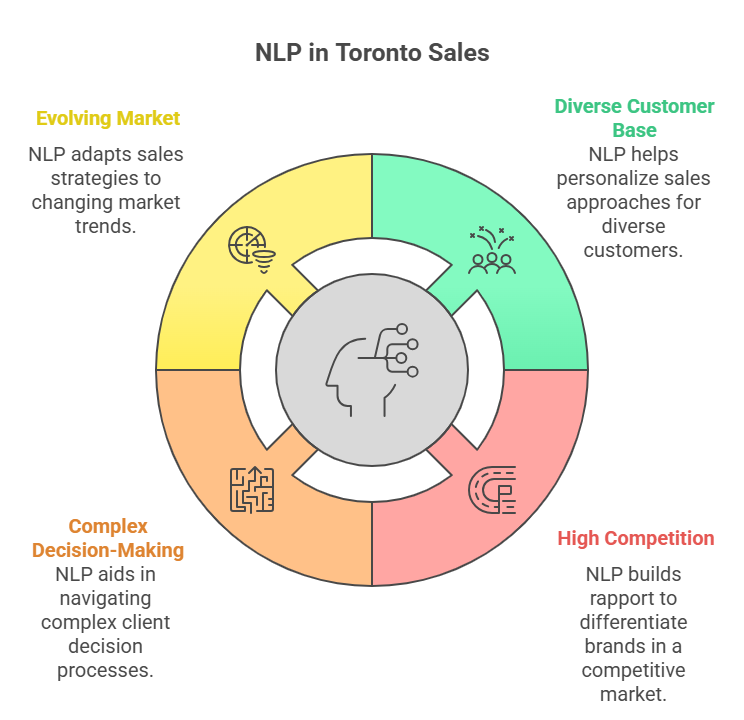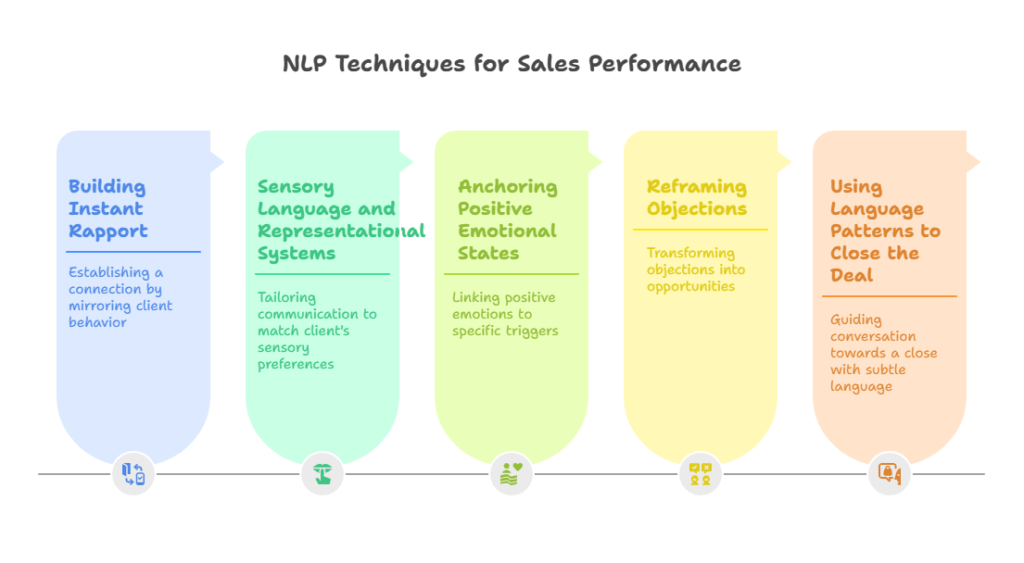Sales teams in Toronto are always on the lookout for the next big thing to boost performance. But what if the key to improving sales wasn’t just a new script or a better product, but a deeper understanding of how people think and communicate? This is where mastering sales with NLP, or neuro-linguistic programming, comes into play.
Imagine you’re sitting in front of a potential client. The conversation is flowing, but you feel a little disconnected. You know your product is great, but something’s missing. With NLP, you can change that dynamic. NLP helps you read the room, understand how people process information and connect on a level that builds trust instantly. It’s not about manipulation it’s about creating an environment where people feel heard, understood, and ready to take action.
In Toronto, where the sales landscape is fast-paced and diverse, NLP offers sales teams a unique edge. It’s about understanding more than just what people say it’s about hearing what they don’t say, recognizing their needs before they voice them, and speaking in a way that moves them to action. Ready to see how NLP can revolutionize your sales strategy? Let’s dive in.
NLP in Sales: Why It Matters
Sales is all about building trust, understanding your customers, and connecting with them on a deeper level. But the key to successful sales isn’t just about what you say it’s about how you say it. This is where NLP (Neuro-Linguistic Programming) comes in. It allows you to tune into your customer’s communication style, ensuring you deliver your message in a way that resonates with them.

Why NLP Matters in Sales:
- Helps build genuine connections: NLP helps you connect with your customers beyond just words, creating a stronger bond by aligning with their communication style.
- Improves communication: It helps you understand whether your client is visual, auditory, or kinesthetic, so you can adapt your message to match their preferred way of processing information.
- Enhances trust and comfort: By aligning your tone, body language, and speech with the clients, you build rapport quickly, making them feel understood and more open to your pitch.
- Increases the chance of success: By speaking your customer’s language, you move beyond just a conversation you create a bond that drives successful sales outcomes.
Unique Sales Landscape in Toronto (Why NLP is Especially Useful in Toronto)
Toronto’s sales environment is fast-paced, diverse, and highly competitive. Sales teams in this city face unique challenges due to the city’s blend of industries and multicultural consumer base. Here’s why NLP is especially useful in helping Toronto sales teams overcome these obstacles:
Diverse Customer Base
Toronto’s market is incredibly diverse, with customers from various cultural, socioeconomic, and professional backgrounds. NLP provides sales teams with the tools to connect with each individual by understanding their communication styles, emotional triggers, and buying behaviors. This helps personalize sales approaches, ensuring that each customer feels understood and valued, no matter their background.

High Competition
In a city like Toronto, where countless brands are vying for attention, sales teams need to find a way to stand out. NLP helps by teaching sales professionals how to build genuine rapport with clients, making them feel comfortable and heard. This emotional connection can be the key to building long-term relationships and differentiating your brand from competitors.
Complex Decision-Making Processes
Toronto businesses often deal with clients who have complex decision-making structures, especially in larger organizations. With NLP, sales teams can read emotional cues and understand underlying concerns, helping them navigate these complex situations more effectively. By addressing hesitations and tailoring their approach, they can guide clients through the decision-making process with ease.
Constantly Evolving Market
The market in Toronto is ever-changing, with new trends and industries emerging all the time. NLP equips sales teams with the flexibility to adapt to these shifts quickly. By understanding how clients’ needs and preferences evolve, sales professionals can adjust their strategies and stay relevant, keeping their competitive edge intact.
By integrating NLP into their approach, Toronto sales teams can navigate these unique challenges more effectively, build stronger connections with clients, and ultimately close more deals in a competitive market.
Core NLP Techniques That Boost Sales Performance
To truly excel in sales, it’s essential to go beyond basic communication. NLP offers powerful techniques that help sales teams connect with clients on a deeper level, improve persuasion, and close deals more effectively.
Building Instant Rapport
In sales, connecting with a client right away is essential. Imagine meeting someone and instinctively matching their body language and tone it’s like hitting the right note in a song. This is what matching and mirroring in NLP helps you do. By subtly mimicking the client’s gestures, tone, or pace, you create a comfortable atmosphere where they feel understood. When people feel at ease, they’re more open to talking and trusting you. This rapport-building technique isn’t about being overly friendly; it’s about creating an environment where the client feels heard and valued.

Sensory Language and Representational Systems
People take in and process information differently. Some think in pictures, others in sounds, and some by feelings. This is known as representational systems. When you can identify whether a client is more visual, auditory, or kinesthetic, you can adjust your pitch to fit their style. For example, if a client says, I see what you mean, they might be a visual learner, so using images or metaphors will resonate.
On the other hand, if they say, I hear you, they likely process information through sound, so using phrases like clarify or resonate will connect better. Matching how they think helps you communicate more naturally and make the sale feel more personal.
Anchoring Positive Emotional States
Have you ever heard a song that takes you back to a great memory? That’s the power of anchoring associating a feeling with a specific trigger. In sales, you can anchor positive emotions like excitement or confidence. For example, if a client feels positive about your pitch, you can link that emotion to a simple gesture, like tapping your pen. Later, when you repeat the same gesture, it can trigger that same positive feeling, helping the client feel confident in moving forward. This simple technique can boost your client’s decision-making and keep the conversation on a positive track.
Reframing Objections
Objections are a part of sales, but NLP teaches you to turn them into opportunities. When a client says, “It’s too expensive,” instead of backing away, you can reframe it. Try saying, I understand that concern. What if we look at it as an investment that will save you more in the long run? This shifts the perspective, helping the client see the value beyond the price tag. Reframing allows you to stay calm and focus on solutions, making it easier to address concerns without losing momentum.
Using Language Patterns to Close the Deal
The way you speak can influence a client’s decision. NLP provides language patterns that guide the conversation toward a close without being pushy. For example, using phrases like, When you start using our product… presupposes that they will buy, gently nudging them in that direction. Words like imagine, consider, or picture trigger the client’s mind to visualize the benefits they’ll experience, making the decision feel more natural and less pressured. This subtle approach helps make the sales process feel smooth and easy.
How to Train Your Sales Team in NLP
Training your sales team in NLP is key to unlocking their full potential. By equipping them with the right tools and techniques, you can help them communicate more effectively and build stronger relationships with clients.
In-House vs. External NLP Training
When it comes to training your sales team in NLP, you have two main options: in-house training or hiring external NLP trainers. Both methods have their unique benefits, depending on your team’s needs, budget, and long-term goals.

Benefits of In-House Training
- Customized to your team’s needs: In-house training allows you to focus on the specific challenges and goals of your sales team. You can tailor the training to your team’s unique selling environment and customer base, making it more relevant and effective.
- Cost-effective: If you already have a team member who is trained in NLP, you could save costs by running internal workshops and sessions.
- Continuous learning: In-house training can become an ongoing process, easily integrated into team meetings, making it part of the daily workflow.
Benefits of External NLP Training
- Expertise: External trainers bring specialized knowledge and experience that may not be available in-house. They can offer fresh perspectives and provide insights from working with other companies and industries.
- Credibility: Having an experienced NLP coach can boost the credibility of your training program. Your team will be more motivated to follow the techniques if they are learning from someone who is recognized as an expert.
- Structured curriculum: External coaches often bring well-structured, proven training programs, which can save time and effort in developing an in-house training curriculum.
What to Look for in a Toronto NLP Trainer or Coach
When selecting an NLP trainer for your sales team, consider these factors:
- Credentials and Experience: Look for trainers who have a proven track record with NLP in sales. They should be certified by recognized NLP organizations and have real-world experience working with sales teams.
- Industry Knowledge: Ideally, the trainer should have experience in your specific industry. If not, they should have a good understanding of how NLP applies to sales in general.
- Personal Style and Approach: Make sure the trainer’s teaching style aligns with your team’s learning preferences. It’s important that they can engage the team and create a comfortable learning environment.
- Practical Applications: Ensure the trainer can provide hands-on, practical training that directly addresses the sales challenges your team faces, rather than just theoretical knowledge.
Creating a Learning Culture Around NLP
To ensure your sales team continuously improves with NLP, it’s essential to cultivate a learning culture that promotes regular practice, feedback, and self-awareness.
- Regular Role-Playing: Use real-world sales scenarios where reps can practice applying NLP techniques, like building rapport, handling objections, and closing deals. Role-playing gives them the confidence to apply NLP in actual sales situations.
- Peer Feedback: After each role-playing exercise, encourage team members to provide constructive feedback to each other. This peer review process helps reps identify strengths and areas for improvement, making NLP skills more effective.
- Post-Call Reflection: Encourage reps to reflect on how they applied NLP techniques during their sales calls or meetings. This self-reflection allows them to pinpoint what worked and what could be improved for future interactions.
- Continuous Feedback Loop: Make feedback a regular part of your sales process, offering both positive reinforcement and constructive criticism. This helps reps continuously refine their NLP skills and stay on track toward improvement.
- Fostering Self-Awareness: Help reps develop self-awareness by encouraging them to evaluate their own performance. The more they self-reflect on their NLP application, the more they’ll grow and adapt to different sales situations.
Common Pitfalls and Misconceptions
Understanding the potential pitfalls and misconceptions around NLP can help your sales team avoid mistakes and maximize the benefits of this powerful tool.
- Misunderstanding NLP as Manipulation: NLP isn’t about tricking or manipulating people. It’s a tool for better communication, helping you understand and connect with your customers on a deeper level, not control them.
- Overusing Techniques: While NLP is powerful, it’s not a one-size-fits-all approach. Over-relying on NLP techniques or using them too aggressively can make your interactions feel unnatural or forced. It’s important to use NLP in moderation and adjust based on the customer.
- Ignoring Individual Differences: Every customer is unique, and NLP should be adapted to their specific communication style. Assuming that everyone will respond the same way can lead to missed opportunities. Always be flexible and mindful of how different clients process information.
- Focusing Only on Language: NLP involves more than just the words you use. Pay attention to non-verbal cues like body language, tone of voice, and even the pace of your speech. These factors can have just as much impact as what you say.
- Expecting Immediate Results: NLP is a skill that takes time to master. Don’t expect instant success. It requires continuous practice, reflection, and refinement to truly integrate NLP techniques into your sales process effectively.
Conclusion
Incorporating NLP into your sales strategy is more than just learning new techniques it’s about fundamentally improving how you connect, communicate, and build lasting relationships with clients. By understanding your customer’s unique communication style and adapting your approach, you can establish trust faster, handle objections more effectively, and close more deals.
In Toronto’s fast-paced and diverse market, NLP offers a competitive edge that can set your sales team apart from the rest. With the right training, ongoing practice, and a commitment to continuous improvement, NLP can transform your sales process, turning ordinary conversations into powerful, persuasive interactions.
So, take the first step today: assess your sales strategy, choose the right NLP training, and start integrating these techniques into your team’s routine. The results will speak for themselves higher conversions, stronger client relationships, and long-term success.
Frequently Asked Questions About Mastering Sales with NLP
Q1: Why use NLP techniques in sales?
NLP helps sales professionals understand customer behavior, build rapport faster, and influence decision-making through language patterns. It allows for more persuasive communication, leading to higher conversion rates, stronger client relationships, and long-term sales success.
Q2: How do you apply NLP in sales step by step?
Start by observing customer language patterns and mirroring their communication style. Use NLP techniques like reframing objections, anchoring positive emotions, and asking precise questions to uncover needs. Finally, align your sales message with the customer’s mindset for a smoother close.
Q3: Are there risks to using NLP in sales conversations?
The main risk is appearing manipulative if NLP techniques are overused or applied without genuine intent. Customers may sense insincerity, which damages trust. To avoid this, use NLP ethically as a tool for understanding and helping clients rather than pushing unwanted outcomes.
Q4: How much does NLP sales training cost?
NLP sales training programs vary widely, from online courses costing $200–$500 to advanced certification programs priced at $2,000 or more. Costs depend on the trainer’s expertise, course depth, and whether live coaching or practical applications are included.
Q5: Is NLP better than traditional sales techniques?
NLP isn’t necessarily “better” but complements traditional sales methods. While traditional approaches rely on scripts and processes, NLP focuses on psychology and communication. Combining both creates a powerful toolkit that adapts to different buyer personalities and situations.





